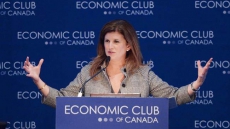OTTAWA — More than a dozen senators who were ordered to pay hundreds of thousands of dollars back to the Senate in questionable expense claims have had their bill reduced by a special arbitrator.
Former Supreme Court justice Ian Binnie has ruled that 14 senators who owed $322,611 properly billed the Senate for travel and hospitality expenses half the time.
The final bill the group of current and former senators now owe is $177,898.
"I impute no bad motives to any of the senators," Binnie said in his report.
He said the predominant attitude he encountered from the senators was that they were not fully aware of the rules, rather than specifically seeking to break or get around them.
"The attitude was, 'If we knew the rules, we would follow them,'" Binnie told a news conference.
"I didn't feel for the most part that they were gaming the system."
The expenses were flagged last year in a critical audit of Senate spending by the auditor general that identified nearly $1 million in problematic expense claims.
In his final report, Binnie said senators were acting in accordance with what they "believed to be their entitlements."
The arbitration process was established after the auditor general raised questions about spending claims from 30 current and former senators totalling nearly $1 million.
Binnie was appointed as arbitrator last May to oversee disputes of the auditor's findings.
Of the 30 senators identified in the audit and ordered to repay the questioned amounts, 14 chose to go through the arbitration process led by Binnie while seven opted out of it and the remaining nine paid back money, according to the Senate website.
Senators found to have spent inappropriately will have 30 days to reimburse the amounts owed.
Amounts outstanding range from $1,120 to $75,227, according to the latest publicly available repayment status report.
The Senate expense scandal was narrowed last week when it was revealed the RCMP informed 24 of the 30 named senators that the evidence against them didn't warrant a full criminal investigation.
On Friday, the chamber of sober second thought had its dwindling numbers bolstered when Prime Minister Justin Trudeau named seven new senators — the first appointments in three years and the first to be based on the recommendations of a new arm's-length advisory board, established by Trudeau in a bid to reduce partisanship in the Senate.




